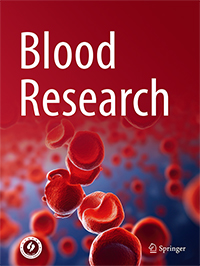Original Article
Korean J Hematol 2009; 44(1):
Published online March 30, 2009
https://doi.org/10.5045/kjh.2009.44.1.14
© The Korean Society of Hematology
Comparison between Conventional Cytogenetics and Interphase Fluorescence in situ Hybridization (FISH) for Patients with Multiple Myeloma
김성현, 김정환, 이동미, 이수, 오성용, 권혁찬, 김경은, 한진영, 김효진
동아대학 의과대학 내과학
Comparison between Conventional Cytogenetics and Interphase Fluorescence in situ Hybridization (FISH) for Patients with Multiple Myeloma
Background: For patients with multiple myeloma (MM), different strategies are used to detect chromosomal abnormalities (CA). There have been a few studies that have directly compared FISH with conventional cytogenetics (CC) for the detection of CA. In this study, we employed a combined approach of metaphase cytogenetics and interphase FISH to investigate the genetic basis for the great heterogeneity observed in the clinical behavior of 28 MM patients.
Methods: Cytogenetic analysis was performed via traditional metaphase karyotype analysis. The FISH studies were done using DNA probes to detect translocations involving the immunoglobulin heavy chain gene (IGH) at 14q32 and deletions of 17p13.1 and 13q14.
Results: CA were detected by CC in 16 patients (57.1%) and by FISH in 14 patients (50.0%) of the 28 patients we studied. 14q32 abnormalities and deletion abnormalities of 13q14 and 17p13.1 were detected by CC in five patients (17.9%), three patients (10.7%) and no patients (0%), respectively and these were detected by FISH in 12 (42.8%), four (14.3%) and five (17.8%), respectively, of the 28 patients we studied. The median follow-up timefor the patients was 23.85 months (range: 0.3∼58.13 months). On the univariate and multivariate analyses, none of the abnormalities detected by cytogenetics and interphase FISH affected survival.
Conclusion: On comparing the cytogenetics and interphase FISH results, we can suggest that both studies should be an essential part of the workup for the diagnosis of patients with MM. Also, both studies may complement each other to predict the prognosis.
Keywords Multiple myeloma, Conventional cytogenetics, Fluorescence in situ hybridization
Article
Original Article
Korean J Hematol 2009; 44(1): 14-21
Published online March 30, 2009 https://doi.org/10.5045/kjh.2009.44.1.14
Copyright © The Korean Society of Hematology.
Comparison between Conventional Cytogenetics and Interphase Fluorescence in situ Hybridization (FISH) for Patients with Multiple Myeloma
김성현, 김정환, 이동미, 이수, 오성용, 권혁찬, 김경은, 한진영, 김효진
동아대학 의과대학 내과학
Comparison between Conventional Cytogenetics and Interphase Fluorescence in situ Hybridization (FISH) for Patients with Multiple Myeloma
Sung Hyun Kim, Jung Hwan Kim, Dong Mee Lee, Suee Lee, Sung Yong Oh, Hyuk Chan Kwon, Kyung Eun Kim, Jin Yeong Han, Hyo Jin Kim
Department of Internal Medicine and Laboratory Medicine, Dong-A University College of Medicine, Busan, Korea
Abstract
Background: For patients with multiple myeloma (MM), different strategies are used to detect chromosomal abnormalities (CA). There have been a few studies that have directly compared FISH with conventional cytogenetics (CC) for the detection of CA. In this study, we employed a combined approach of metaphase cytogenetics and interphase FISH to investigate the genetic basis for the great heterogeneity observed in the clinical behavior of 28 MM patients.
Methods: Cytogenetic analysis was performed via traditional metaphase karyotype analysis. The FISH studies were done using DNA probes to detect translocations involving the immunoglobulin heavy chain gene (IGH) at 14q32 and deletions of 17p13.1 and 13q14.
Results: CA were detected by CC in 16 patients (57.1%) and by FISH in 14 patients (50.0%) of the 28 patients we studied. 14q32 abnormalities and deletion abnormalities of 13q14 and 17p13.1 were detected by CC in five patients (17.9%), three patients (10.7%) and no patients (0%), respectively and these were detected by FISH in 12 (42.8%), four (14.3%) and five (17.8%), respectively, of the 28 patients we studied. The median follow-up timefor the patients was 23.85 months (range: 0.3∼58.13 months). On the univariate and multivariate analyses, none of the abnormalities detected by cytogenetics and interphase FISH affected survival.
Conclusion: On comparing the cytogenetics and interphase FISH results, we can suggest that both studies should be an essential part of the workup for the diagnosis of patients with MM. Also, both studies may complement each other to predict the prognosis.
Keywords: Multiple myeloma, Conventional cytogenetics, Fluorescence in situ hybridization

Article Tools
Stats or Metrics
Related articles in BR
-
Recent advances in cellular immunotherapy for lymphoid malignancies
Haerim Chung, Hyunsoo Cho
Blood Res 2023; 58(4): 166-172 -
Advantage of achieving deep response following frontline daratumumab-VTd compared to VRd in transplant-eligible multiple myeloma: multicenter study
Ja Min Byun, Sung-Soo Park, Sung-Soo Yoon, Ari Ahn, Myungshin Kim, Jung Yeon Lee, Young-Woo Jeon, Seung-Hwan Shin, Seung-Ah Yahng, Youngil Koh, Chang-Ki Min
Blood Res 2023; 58(2): 83-90 -
Epigenetic and genetic investigation of SOCS-1 gene in patients with multiple myeloma
Fatıma Ceren Tuncel, Istemi Serin, Sacide Pehlivan, Yasemin Oyaci, Mustafa Pehlivan
Blood Res 2022; 57(4): 250-255




 PDF
PDF Standard view
Standard view Export citation
Export citation Share
Share  Previous Article
Previous Article



